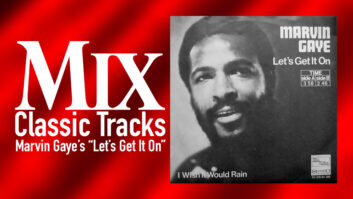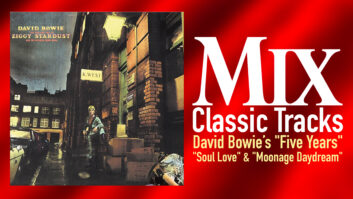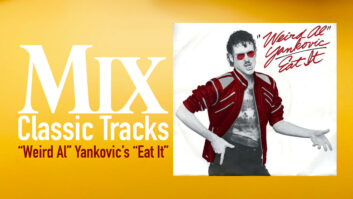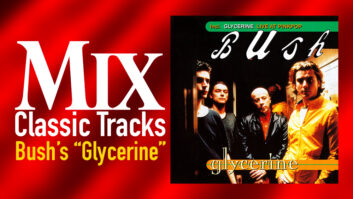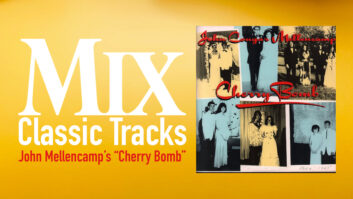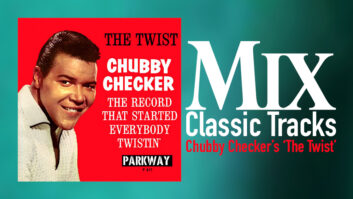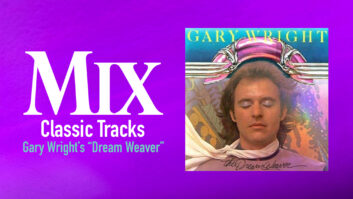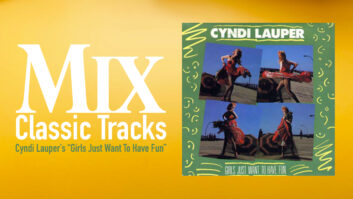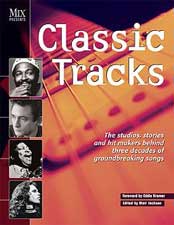
When Warren Zevon emerged in the midst of L.A.’s vibrant singer/songwriter scene in the mid-’70s, he was like a breath of…well, strange air. As a songwriter, Zevon bore little resemblance to the other leading craftsmen of the day, such as his friends Jackson Browne (who produced Zevon’s brilliant first Asylum album), Don Henley and Glenn Frey of The Eagles, or J.D. Souther. Zevon’s vision was darker, more bent than that of his peers. Critics invariably talked about his debt to Raymond Chandler, Dashiell Hammett and the noir detective films and books of the ’40s; at the same time, his vivid portraits of society’s underbelly seemed completely contemporary. Zevon’s L.A. was a world of shadows and closed doors, desperate characters and crippling ennui. There was a dramatic grandeur in his music that was also tinged with sadness. His booming voice and sturdy piano lent strength to the sometimes weak and troubled souls that populated his songs.
Read more “Classic Tracks”
Buy the book
Looking at the particulars of Zevon’s upbringing and early career, it’s hardly a surprise that he developed a unique songwriting perspective. Born in Chicago in 1947, he was the only child of an uneducated Russian immigrant gambler and an American mother. The family was often on the move during Warren’s youth, bouncing between San Francisco, Fresno, Calif., Phoenix, L.A. and other locales depending on “whether my mother or father was influencing the course of events,” he said in 1980. “Because of my father’s profession, our situation rose and dropped pretty radically,” Zevon said. “I remember as a kid that inexplicably the bottom would fall out and we’d be living in a tract house in Fresno. And then for some reason, we’d be living in a hotel in Vegas or a cliff house in Palos Verdes. Then back into a tract home. But Los Angeles was always sort of the crux of the moves.”
Zevon was a serious piano student as a youth, with a deep interest in modern classical music (during his junior high years in San Pedro, south of L.A., he even met and befriended Igor Stravinsky, who was working in Hollywood then), but by the time he hit Fairfax High in L.A. in the early ’60s, he’d been swept up by the folk music boom and started playing guitar. He also started cutting classes to hitchhike up and down the California coast, livin’ la vida Kerouac a bit; although undeniably smart, he was bored by school. When he was 15, his father gave him a car he’d won through a gambling match, and Warren and a friend took off for New York, determined “to be Bob Dylan,” he said. “It didn’t work. We stayed in the Village and played these basement clubs, but I wasn’t exactly a seasoned performer. I’d lose all my fingerpicks down inside the hole of my guitar, and then I’d be too humiliated to pass the basket.”
Eventually Zevon migrated back to the West Coast, playing in a Beatle-ish band in San Francisco for a spell, then heading down to L.A., where he sang in a duo called Lyme & Cybelle with a female friend from Fairfax High. They released two unsuccessful singles on White Whale Records, home of The Turtles, who covered Zevon’s “Like the Seasons” as the B-side of their smash “Happy Together.” During this period, Zevon managed to scrape by earning money as a session musician and a writer/arranger of music for TV and radio commercials-not bad for a teenager. In 1968, around the time he turned 21, Zevon met Jackson Browne, a promising young songwriter who was just starting to create a buzz in L.A., though he was still a few years away from recording his first album. Zevon and Browne became close friends and, a few years up the road, would work closely together.
In 1969, a demo tape of Zevon’s songs found its way to L.A. producer/scene-maker Kim Fowley, and that led to the recording of Zevon’s debut album, Wanted Dead or Alive, which died on arrival and immediately went out of print, so fast, in fact, that most don’t even consider it Zevon’s first album. “It was crazy-the budget was so small that we had one good drum track, which we slowed down for the ballads and played backwards for the psychedelic stuff,” Zevon recalled with a laugh. “Initially Kim was the producer, but he kind of bowed out, and I finished it.”
Next, Zevon landed a job as the pianist and bandleader for the Everly Brothers, and it was here that he encountered one of the principal players in the “Werewolves” saga, guitarist Waddy Wachtel. “one of the first gigs I got out of L.A. [after moving here from New York] was playing guitar for the Everly Brothers and Warren was the bandleader, so I actually had to audition for him,” Wachtel recalls. By 1973, though, the Everlys had split up and Zevon, at the insistence of Browne, signed a publishing agreement with David Geffen’s Companion Music, “mainly because Jackson had twisted [Geffen’s] arm,” Zevon recalled. “He’s never stopped harboring this strange idea that I have po-ten-tial.” The signing had little impact on Zevon’s immediate fortunes, however, and after struggling around L.A. for another year or more, he and his wife and young daughter moved to a resort town on Spain’s Mediterranean coast where he could live cheaply and hone his songwriting craft.
Back in L.A., Browne managed to get Zevon a recording deal with Geffen’s Asylum label (where Jackson had developed into an established star), and Browne agreed to produce his friend’s first LP. That news was a sufficient lure to get Zevon to go back to Los Angeles. Zevon’s eponymous debut was ecstatically received by critics and fans of literate rock ‘n’ roll when it was released in 1976. Zevon’s classical training came to the fore in his stirring string arrangements, and Browne and Zevon managed to corral an impressive group of top L.A. musicians and singers (most of them friends) to help out, including guitarists Wachtel (by then a first-call session ace) and David Lindley, bassist Bob Glaub, drummers Larry Zack and Gary Mallaber, and, on backing vocals, Browne, J.D. Souther, Glenn Frey, Don Henley, Phil Everly, Bonnie Raitt, Beach Boy Carl Wilson, and Fleetwood Mac’s Lindsey Buckingham and Stevie Nicks. The album was cut mostly at Elektra Sound Recorders by engineer Fritz Richmond and mixed at Sunset Sound by John Haeny.
It was around the time that album was being made that “Werewolves of London” was born out of the fertile imaginations of Zevon, Wachtel and Waddy’s songwriter friend LeRoy Marinell. As Waddy tells the story: “We wrote the song one afternoon. I remember going by Roy’s house one afternoon on my way into town to do some sessions, and Warren was there, and he says , ‘Waddy, it’s great you’re here! Phil Everly gave me a great title for a song. We’re going to write a song called “Werewolves of London.” I said, ‘”Werewolves of London?” okay.’ Now, Roy had been sitting around for months with this little guitar figure [which eventually became the main piano vamp for ‘Werewolves’], and we never could do anything with it. I said to Warren, ‘”Werewolves of London?” You mean like, “ow-ooooo”?’ Warren says, ‘Yeah, yeah!’ I said, ‘That’s easy: Roy, play that lick of yours.’ And he started playing it. I had just gotten back from England so I had all these lyrics in my head, so I just spit out that whole first verse. Warren says, ‘That’s great!’ I said, ‘Really? okay, fine-there’s your first verse. You write the rest; I’ve gotta go into town.’ And then they worked on the rest of it.”
Browne occasionally performed the song at his own concerts before Zevon got around to cutting “Werewolves” for his second Asylum album, Excitable Boy, recorded in late 1977 and released in 1978. This time, Browne and Wachtel produced together.
“I didn’t know Jackson before I worked on Warren’s [first Asylum] album,” Waddy remembers. “The funny thing is, after that record came out, I went on the road with Linda [Ronstadt] to Europe, and some interviewer over there said, ‘I want to ask you about Warren Zevon’s record.’ ‘oh, okay.’ This is one of my virgin interviews, and I was ready to blab away. ‘What did you think of Jackson’s production?’ And I said, ‘Well, you know, being there as much as I was and watching the whole process, I think Jackson maybe had his hands too full, and he didn’t really know what to do some of the time; it was a little out of control, and he didn’t know how to handle it.’ I’m figuring, ‘oh well, I’m way the hell over here in France; no one is going to read this.’
“I swear, the day I got home from the trip-my jacket was still on-and the phone rings, and it’s Jackson. ‘Hey Jackson, how ya doin’ man?’ ‘I’m doin’ fine, Waddy. I read your interview.’ ‘Huh? What?’ ‘I read your interview. So I had my hands too full, and I didn’t know what I was doing, huh?’ ‘Uh, yeah. That’s what I said.’ He says, ‘You’re absolutely right. That’s why I’m calling you. I want you to do the next record with me.’ I said, ‘What are you talking about. You don’t even know me.’ He says, ‘Waddy, believe me, I know you better than a lot of people right now. I know where I stand with you, and I really think you and I together could get Warren corralled to do this record,’ because Warren was really pretty wild back then. So that’s how I got my first major production gig.
“It was all new to me so I felt like I was walking on eggshells a bit. And that’s when I met [engineer] Greg Ladanyi. I’d seen him around the Sound Factory, but we’d never really worked together. And the three of us ended up being this pretty good team making that album.”
Ladanyi had first worked with Browne on Jackson’s 1976 masterpiece, The Pretender-when top Sound Factory engineer Val Garay was unable to mix the album, Ladanyi, Garay’s second, managed to land the job. It was Ladanyi’s big break and the beginning of long and fruitful relationship with Browne. Ladanyi still speaks reverently about the Sound Factory and its original owner, the great engineer/producer David Hassinger, who recorded some of the Rolling Stones’ early classics, as well as ’60s discs by the Jefferson Airplane, Grateful Dead, Sam Cooke and others.
“The Sound Factory was like the David Hassinger School of Recording,” he says. “That man was brilliant. He was one of those guys who had a magic about him and how he did things. He taught Val Garay, he taught me, he was responsible for some of the other guys who came through there, a number of really good engineers who are still doing good work.
“He had great equipment in the Sound Factory, all you could ask for-an API console, Fairchilds, LA-2As, 1176s, the Phase Linears on the speakers. We had four of the old EMT 140 plates and an unbelievable microphone collection-251s, U47s, M50s, M49s. He had the old Neumann 54s, which were so great on strings; I learned a lot about how to record string sections from him. That studio was a racehorse-it was in great shape; he had things very well-tuned.”
Basic tracks for Zevon’s Excitable Boy album were cut live to 3M 24-track recorders at the Sound Factory, with solos and overdubs added later. Again Browne enlisted the creme de la creme of L.A. session heavies (some of whom were also players in his touring band)-Wachtel; bassists Bob Glaub, Lee Sklar and Kenny Edwards; drummers Russ Kunkel, Jeff Porcaro and Rick Marotta; and a host of singers, including Browne, Souther, Jennifer Warnes, Linda Ronstadt (who by this time had covered three Zevon songs on her own albums), Wachtel, Edwards, Jorge Calderon and Karla Bonoff.
But cutting the basics for “Werewolves of London” was unusually problematic. “We were doing a lot of the record with Russ Kunkel and Bob Glaub, but when we got to ‘Werewolves,’ we tried it with them, and it just didn’t sound right,” Wachtel says. “We got a decent track, but there was something lacking in it. It didn’t sound stupid enough; it sounded cute. Jackson was saying, ‘It’s really good!’ and Warren and I were saying, ‘No, man, it’s too cute. It’s got to be…heavy. So we proceeded to try five or six bands after that-Russ and Lee Sklar, Jeff Porcaro and Bob Glaub, Jeff Porcaro and Lee Sklar, Michael Botts on drums, Gary Mallaber on drums, both with different bass players-and it just wasn’t working. It was getting depressing. Then, and I can’t remember whose idea it was, someone mentioned Mick Fleetwood and John McVie [of Fleetwood Mac], and I flashed, ‘That’s it! That’s who can play this f-ing song!'” Adds Ladanyi, “The energy that ‘Werewolves of London’ demanded was this kind of animal feeling in the rhythm and the whole attitude of the song. And when you think about Mick Fleetwood and the way he plays…well, there was the werewolf right there. It was perfect!”
Wachtel continues: “So I called them, because I’d been working with Stevie [Nicks] and Lindsey [Buckingham]. They came down, we set ’em up, and we did a take, and then we did a second take. After the second take, I looked at Jackson and said, ‘That was pretty good, wasn’t it?’ ‘Yeah, that was pretty good, but Mick doesn’t quite have it yet.’ Mick says, ‘Yeah, we don’t have it yet; let’s keep going.’ Well, we kept going until 6 in the morning! I remember at about 5 in the morning saying to Mick, ‘I think we’re done!’ and Mick looks at me with that crazy look he gets in his eyes and sort of whispers, ‘We’re never done, Waddy!’ I thought, ‘Shit, we’ve got a wild one here!’ So we put in another hour, and at about 6 in the morning, we were up to about take 59, and I looked at Jackson and said, ‘Hey Jackson, take two was pretty good, wasn’t it?’ He said, ‘Yeah, let’s hear take two.’ We listened to take two, and I said, ‘Gentlemen, thank you very much!'”
For Wachtel’s short but punchy solo on the song, “I sent everyone away, ’cause I really wanted to work up a great solo. I got my sound set up, got a nice bottle of vodka. I said to Dennis Kirk [who helped engineer], ‘okay, run the tape!’ The solo came up; I played it. I looked at Dennis, I played it back and said, ‘That’s it!’ I didn’t even get to open the vodka! Then I put a harmony on it, and it was finished. The solo took as long as it takes to hear it.”
The sessions for Excitable Boy were spread out over nearly nine months to accommodate Browne’s hectic touring schedule. When everyone was in town, though, they worked hard-and played hard; this was, after all, L.A. in the ’70s. (Later, Zevon admitted he was drunk most of the time when he was making the record. He sobered up in time for his next album, Bad Luck Streak in Dancing School, which he co-produced with Ladanyi.) There was even a late change in the vocal on “Werewolves,” months after the track had been recorded. As Wachtel remembers it: “Warren wasn’t happy with one of the last lines. ‘I’ve gotta have one more line, Waddy!’ ‘okay, Warren, you’re the guy!’ So I’m on the road, and I get this call: ‘Waddy, it’s Warren. I’ve got the last line-“I saw a werewolf drinking a pina colada at Trader Vic’s, and his hair was perfect.”‘ ‘That’s it?’ ‘That’s it!’ ‘okay, Warren. Whatever you say!’ And strange as it was, it was the right line. That’s Warren,” he laughs. (Ladanyi recorded Zevon’s vocals using a Neumann U67. “He was singing up close with a pop screen because he had that big, big voice,” he notes.)
The mix, on the Sound Factory’s API, was problem-free, Ladanyi says. “Part of what I learned from David Hassinger is that you’re kind of mixing as you go along, from the birth of the recording. So it’s not like the mix is going to be some great revelation usually. Waddy and Jackson let me do my thing with the sound and the EQ and the effects and the reverb and the placement, and then they would be very involved with the balance of instruments, and they helped with the rides. We didn’t have computers back then, so we needed hands on the board to move faders.” (Dennis Kirk was also involved in the mix.)
Excitable Boy, released in the spring of 1978, is an album with several “classic” tracks-besides “Werewolves of London.” It contains “Johnny Strikes Up the Band,” the title cut, “Tenderness on the Block” (co-written by Zevon and Browne) and the primal powerhouse “Lawyers, Guns and Money.” Wachtel says that when Asylum chose “Werewolves” as the leadoff single, “Warren and I were completely insulted! ‘What’s wrong with these people?!’ And sure enough, it became the biggest hit Warren ever had.” Indeed, it rose as high as Number 21 on the Billboard singles chart, and it remains his best-known song. Zevon has put out many fine albums since-including his widely acclaimed new album, Life’ll Kill Ya (on Artemis Records)-but none have enjoyed the commercial success that propelled Excitable Boy to Number Eight. It was a wild album for a wild time. “There was definitely something special about that record,” Ladanyi says. “You hear it on the radio today and it still sounds great.” ow-oooo!
